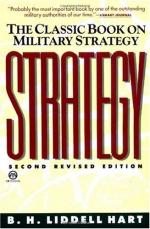
|
| Name: _________________________ | Period: ___________________ |
This quiz consists of 5 multiple choice and 5 short answer questions through Conclusions from Twenty-Five Centuries.
Multiple Choice Questions
1. What two major elements of martial skill were combined successfully in Europe in the medieval era?
(a) Archery and close quarters combat.
(b) Swordplay and horsemanship.
(c) Archery and horsemanship.
(d) Single combat and swordplay.
2. According to the indirect method, which of the following is true regarding attacks on enemy resources and psychological conditions?
(a) They are almost never effective.
(b) They are effective, but too hard to carry out.
(c) It is impossible to know if they are successful.
(d) They are highly effective.
3. At the height of his power and greatness, Napoleon was likened to what historical figure?
(a) Caesar.
(b) Mark Anthony.
(c) Darius.
(d) Belisarius.
4. In what area of generalship did Belisarius excel?
(a) Defensive strategy.
(b) Offensive strategy.
(c) Logistics.
(d) Fire weapons.
5. Why did many European principalities fail to become strong, united nations?
(a) The philosophy and religion of the time discouraged it.
(b) Individual princes were unwilling to give up their power.
(c) There was insufficient technology to support a large state.
(d) Constant bickering drove them apart.
Short Answer Questions
1. In what way did Caesar excel as a general?
2. According to one of the aphorisms introduced at the beginning of the book, what is the likely outcome for all nations that participate in a war?
3. How were the Greeks able to fend off the Persian's first war against them?
4. Which of the following best embodies how a war might be ended using the indirect method?
5. How long does the author say it took Caesar to make the Mediterranean his?
|
This section contains 346 words (approx. 2 pages at 300 words per page) |

|




